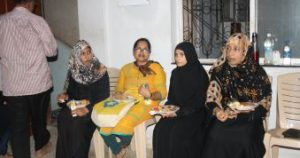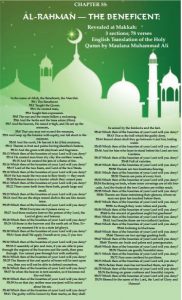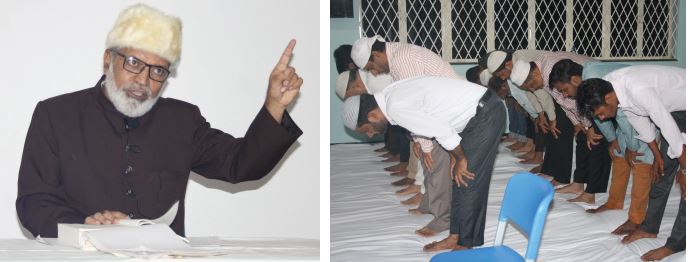BLESSINGS: At the `NIGHT OF BLESSINGS’ iftar (breaking of the fast) gathering at Wisdom House jamaat premises at Tonca Junction — a glimpse of Ramzan routine, the offering of namaaz
ONE recent event impinged on my c o n s c i e n c e recently, my dears. It is to do with the world of Islam! What do we know about it? Too much! You may exclaim. Agree with me that it’s not an easy time currently for Muslims (of various denominations) around the world and in India. Perhaps we should take time off to understand one of the world’s finest religions — Islam — even if many of us who are non Muslims think Islam can do with some reformation of the modern, practical kind, in an increasingly difficult, complex and revengeful world.
This is to say it was the month of Ramzan or Ramadan and most of us know that the Muslim community the world over observes this month by fasting without food and water all day, and then breaking their fast at home with family or at their local jamaat (community hall) or masjid with some dates and fruit, doing namaaz (prayers) and then having dinner before going to sleep to wake up at the crack of dawn for the sehri breakfast, after which another day’s fast commences…and so the days pass by during the holy month till the crescent moon is sighted and Eid-ulFitr is celebrated with a final thanksgiving for the gift of life.
I was pleasantly surprised when the local House of Wisdom at Tonca, a bookshop for all kinds of religious and philosophical books, mostly of the Islamic world, sent me an invitation to partake of “Ak raat Ishwar ke saath” on June 16, 2017. It was an evening of considerable charms as I made friends with the women, Nazrana Shaikh, Ambrim Baig, Shahida Khan and others later on.
Wisdom House doubles as The Centre for the Study of Philosophy and Humanities as also serves as the local jamaat or community centre where anyone may go to do namaaz (offer prayers) or meet their fellow community people. Shahida is happy to clue me up and tells me they are now observing the last ten days of Ramzan when the story goes that the Koran was given to the community to read, on this night they read, pray, stay awake in memory of all the blessings they reap from Allah or God Almighty in any name…they count their blessings and hence “these are the final ten nights of blessings.”
AT 7 pm or so, the day’s fast was broken collectively with a plate of fruit given to all and I relished my two dates on a fruit plate, along with a vegetarian patti samosa, tetra packs of soft drinks and water bottles which were distributed to all. The non-Muslim guests were not breaking fast of course but we enjoyed the snacks and chatted with each other.
The women said we can watch them do namaaz – the men separately, the women in a room of their own — and after that there would be some talks and video screenings of episodes from the Quran. While Akbar Khan was the host of the evening, it was Maulana Zafar Alam Nadvi and Prof Abdullah SM who spoke about the need to be grateful for the many favours the Almighty has bestowed on us for none of these favours are favours any of us turn down. In fact, one of the screenings was pure poetry in lyrical Arabic of the beautiful earth with all its natural gifts — Chapter 55 of the Quran titled al Rahman, The Benefi cent with its memorable refrain of “Which then of the bounties of your Lord will you deny?”
Today, said Prof Abdullah we may think there is no God but then if we look around we will see that everything has been made or bestowed by somebody. Nothing comes from nothing. So why don’t we accept that if everything is a gift courtesy somebody, the good earth and its gardens of blessings are also gifts created by somebody — God Almighty. Even men of science know creativity would be impossible if the raw natural elements were not there, who made them? The sky, earth, air, sun, moon, stars, trees, fl owers, fruit, the little and big creatures of the wild and humankind?
Christianity and Islam share a lot of commonality on the subject of creation of humankind and the garden of paradise story — Eve and Adam and the role of Saturn/Lucifer in the form of the snake of knowledge, the eventual loss of innocence and banishment from the heavenly garden of paradise. Most of us know this story but how many of us take time off to study and understand the world’s most misunderstood religion? Think again, of how much India’s largest minority has contributed to our collective cinema and music, literature, the arts, cuisine?
How much poorer we would be without Islam, Christianity, Buddhism and their contribution through the ages (despite history’s story of invasions, killings, lootings, conquest, conversions, centuries of rule and eventual sweet syncretisation)?
The sweet young Ambrin offers to demonstrate how they do namaaz and I watch her graceful bowing and prayers. You pray five times a day, isn’t it difficult? I asked. She smiled, “We get used to it and it takes only some time to remember God and thank him for his blessings!”
I cannot help thinking that if one has to pray five times it is too much — I definitely do not want to be a Muslim woman! Hinduism is easier to practice with its liberal tolerance. (Please don’t tell me all that is changing and Hinduism as we know it will soon emerge in a new avatar never before seen or no true blue Hindu would ever recognize!)

SHAHIDA Khan smiles and listens to me, asks me if I’d come and talk to them at their community centres one of these days? Perhaps they need to hear all viewpoints to broaden their own understanding of the world we inhabit collectively. Unity in diversity sounds very nice but please don’t think Islam is a diffi cult religion to practice! It is actually very community-oriented, generous and ever grateful to the Almighty for His blessings, even if the Almighty is cast in a male mode!
To say the least here, my dears, I enjoyed my dinner at the jamaat and talking to my new made friends. I can’t say I have too many Muslim friends in India but it’s never too late to make a beginning, right? I must go back to Wisdom House more often and learn how to do namaaz from Ambrin. Why not? In how many ways may we pray as long as we pray sincerely and with little coercion.
I do believe that we should learn about all the religions of the world in our education and choose to pray in whatever way we wish, a little bit of this and that borrowed from Hinduism, Christianity, Islam, Buddhism, even wild paganism if you’re asking me.
To be honest, my dears, some of my favorite people are those who call themselves nastik, atheist, agnostic — while I know there are some terribly religious folk who’re casteist, tyrannical, venal, and do the most pitiful devilish stuff! Take your pick.
On that note it’s avjo, poiteverem, selamat datang, au revoir, arrivedecci and vachun yeta here for now.
-Mme Butterfly

